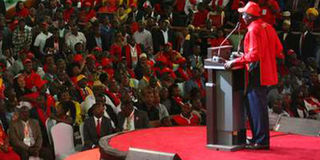Jubilee can only have meaning if it fights tribalism and graft

Deputy President William Ruto addresses delegates at Safaricom Stadium Kasarani on September 9, 2016 during a delegates meeting to form Jubilee Party. PHOTO | EVANS HABIL | NATION MEDIA GROUP
What you need to know:
- What we have seen this week is an experiment in democracy during which a fairly large number of political parties willingly folded up to join the ruling alliance.
- As a vehicle for winning elections and running the country, Jubilee has no choice but to fight the two main vices that bedevil us — negative ethnicity (tribalism), and endemic corruption.
"Democracy means government by discussion, but it is only effective if you can stop people talking." — Former British Prime Minister Clement Atlee (1945-1951).
In many respects, democracy is a twin sister to chaos and disorder and it doesn’t come cheap. Nor is it natural.
It is a political system in which supreme power is vested in the people, power they exercise by regularly electing their representatives in government.
This definition does sound attractive, but in practice, it can be crudely disruptive.
The fact is, democracy is an ideal that people always try to reach; it can never be an end in itself.
In short, it is a work in progress, an imperfect imposition that must be constantly improved on, for the natural instinct of human beings tends towards authoritarianism by the few and submission by the many.
What we have seen this week is an experiment in democracy during which a fairly large number of political parties willingly folded up to join the ruling alliance.
It is a marriage in which the suitor, Jubilee, has consensually cohabited with other parties that, on their own, could never acquire the muscle to run the affairs of this country.
In that sense, it has been a historic moment of consummation, though Kenyans will not know the end product for the next nine months or so.
To craft this arrangement took at least nine months of negotiations, a great deal of effort, as well as goodwill.
It is, therefore, difficult to tell why some people are uneasy with the merger, though, to be sure, politicians will always read sinister motives in any move made by their competitors.
But it is necessary to ask a few questions. Are those who merged into the Jubilee Party persuaded that this is the best thing for the country?
Could it be that a behemoth has been born, one that will crush underfoot the aspirations of Kenyans, or is the mega-party just what the doctor ordered for whatever ails the country?
WORD OF ADVICE
There are two ways of looking at this issue. The first is that the architects of this merger may have created a monster, one that will return us to those days of totalitarianism in which freedom of expression were stifled, lives micro-managed, and submissiveness entrenched.
That doesn’t look likely, but if it did, it would be a monumental tragedy.
Those who have been voicing opposition to this merger should not be dismissed offhand.
Examples abound of political parties which became over-bearing and despotic while insisting they were democratic just because they allowed regular elections, albeit ones with pre-determined outcomes.
On the other hand, there is nothing wrong with creating a strong party that will get things moving.
Former British Premier Atlee could have been right. But then, although politicians are paid to talk, too much democracy is as bad as too little, because the former leads directly into gridlock which allows nothing to work, while the latter leads into an insidious form of coercion in which free choice, productivity and enterprise are inhibited.
If the Jubilee Party is to succeed, it must seek to balance the two imperatives — getting work done while at the same time tolerating dissent.
As a vehicle for winning elections and running the country, Jubilee has no choice but to fight the two main vices that bedevil us — negative ethnicity (tribalism), and endemic corruption.
The score-card on these inimical manifestations of the Kenyan character has not flattered any of the three previous administrations.
The Jubilee Alliance was not faring any better either.
UNNECESSARY FLAK
It cannot be that the corruption networks will forever call the shots in this country, stymying every effort to grow the economy.
The tribe cannot always be uppermost in people’s minds. The consistent mobilisation of tribes against others, especially during electioneering periods, has become a way of life.
Our parties have come to rely on tribal arithmetic for popularity instead of the policies they espouse.
A situation in which demography has gradually replaced democracy can never be good for any country.
In the meantime, the detractors of this merger are just playing politics.
Telling Jubilee off for merely seeking a winning formula sounds hollow; they should just follow suit if they like.
It wouldn’t harm this country to have two major parties tearing at each other so that a third major force can emerge and keep Jubilee and Cord on their toes.





